Last month, a young woman stepped out of a Harare club for air, and was arrested by a plainclothes policeman on a charge of loitering and soliciting. She spent the night in a cell at the police station. A week later, writer,Tsitsi Dangarembga, was interrogated by police while waiting for friends at a restaurant. In Zimbabwe, women across the spectrum are apprehended nightly by the police under the auspices of the Criminal Law Act (2004), a far reaching tool of government repression covering everything from national security to ‘public morals’. “It’s about policing women’s bodies,” says Winnet Shamuyarira, an activist organiser.
“They want to control what I do with my body. I am a citizen of Zimbabwe yet I’m unable to exercise the same rights as a man…? You see a lot of men milling around—but no one touches them. I was arrested because I am a woman.” Winnet has been arrested three times since 2001. The Criminal Law Act also criminalizes abortion, HIV transmission, prostitution, and witchcraft, among other behaviours deemed socially unacceptable.
“The [police] force has mastered the art of making women feel unsafe and insecure in their own country, a country whose independence they also fought for as soldiers, burden bearers and mothers of the revolution, hoping that the same principles of social justice that the nationalists promised during the struggle would translate into reality for people of all sexes afterwards. But this was never to be for women. For women the journey to freedom and emancipation since Independence Day continues to be thorny and potholed, marred by violence and intimidation, and in some cases with loss of life at the hands of our fellow men.” ~ Dudziro Nhengu, What self-care means for me as a form of feminist activism!
 Women activists are organising in response to these violations, drawing on the kind of security, safety and peace that only the power of numbers can give. Despite the many risks activists face in standing up for their rights, women have refused to be silenced, “We’ll have to think outside the textbook, there is no chapter entitled, ‘How to respond to women’s arrests.’ But maybe we can write our own chapter by sitting together, looking at the conditions, looking at what our constituency is and then acting accordingly,” said Tsitsi Dangarembga. In June and July, women organized a targeted strategy that included a petition, a march through Harare’s city centre, and information-sharing activities on the law and constitution to help women better defend themselves.
Women activists are organising in response to these violations, drawing on the kind of security, safety and peace that only the power of numbers can give. Despite the many risks activists face in standing up for their rights, women have refused to be silenced, “We’ll have to think outside the textbook, there is no chapter entitled, ‘How to respond to women’s arrests.’ But maybe we can write our own chapter by sitting together, looking at the conditions, looking at what our constituency is and then acting accordingly,” said Tsitsi Dangarembga. In June and July, women organized a targeted strategy that included a petition, a march through Harare’s city centre, and information-sharing activities on the law and constitution to help women better defend themselves.
As a part of this strategy, the value of safe spaces for women to come together to share, reflect, envision and strategise collectively cannot be discounted—particularly in a context where women’s movements have been so severely weakened and fragmented and where people are pitted against each other based on diversity and difference.
“As women, we can only change men’s mindsets by firstly changing the way we relate with each other as sisters, activists and feminists and also by changing our modes of activism for better partnerships, for creating safe spaces where we can meet and brainstorm and strategize on how to influence court process, laws and policies that work, then we can begin to talk about changing mindsets.” – Dudziro Nhengu


























